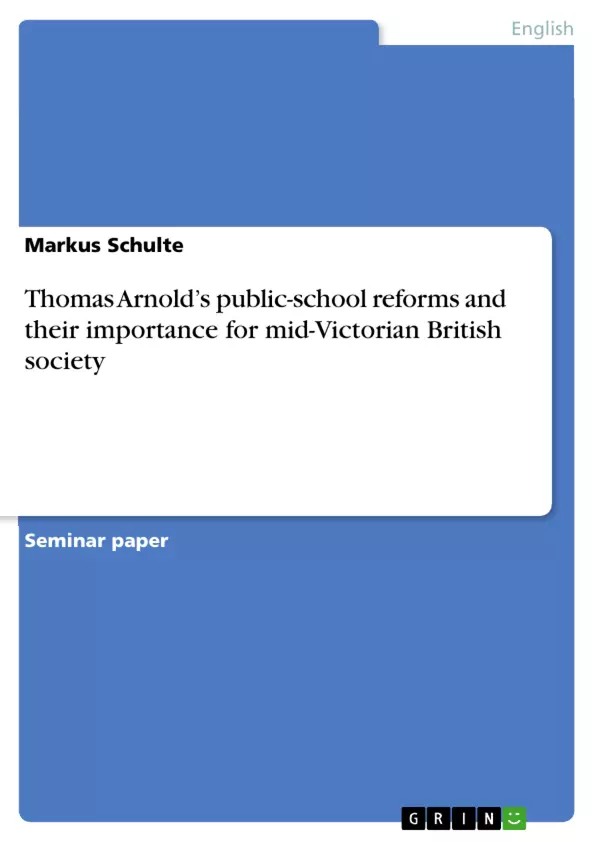This coursework reflects on Thomas Arnold's reforms at Victorian public schools and their influence on British society. Thomas Hughes's famous semi-autobiographical "Tom Brown's Schooldays" is used to show how these changes affected the individual pupil and, seen from a macro-perspective, Britain's mid-Victorian society, especially its economy.
Diese Hauptseminararbeit beschäftigt sich mit Thomas Arnolds public-school Reformen und deren Auswirkung auf die Britische Gesellschaft. Thomas Hughes halbautobiographischer Roman "Tom Brown's Schooldays" soll die Auswirkungen auf den einzelnen public-school Schüler zeigen, aus einer Makroperspektive, die Effekte auf die mittelviktorianische Britische Gesellschaft, insbesondere die Wirtschaft.
Table of Contents
- Thomas Arnold's public school reforms and their importance for Britain's society.
- What is a public school?
- Thomas Arnold: the most prominent public school reformer.
- The person Thomas Arnold.
- Thomas Arnold's reforms at Rugby.
- "I want to be Al at cricket and football, and all the other games”: Muscular Christianity and competition.
- "I want to carry away just as much Latin and Greek as will take me through Oxford respectably\": the classical-oriented curriculum.
- "I want to leave behind me […] the name of a fellow who never bullied a little boy\": the prefect system.
- The influence of Public Schools on the society of mid-Victorian Britain.
- Public schools and economic decline
- The British public school in the late 19th century: friend or foe of the British society?
Objectives and Key Themes
This paper explores the reforms implemented in British public schools during the mid-19th century, focusing on the impact of these changes on the societal role of these institutions. The aim is to understand the reasons behind the appeal of these schools to upper-class families and to assess whether these schools effectively fulfilled the expectations placed upon them.
- Defining the concept of a "public school" in mid-Victorian Britain.
- Analyzing the reforms introduced by Thomas Arnold at Rugby School and their impact on other public schools.
- Examining the influence of public schools on British society in the second half of the 19th century.
- Exploring the relationship between public school education and the economic decline at the end of the 19th century.
- Assessing the role of public schools in meeting the expectations of the upper class and their broader societal responsibilities.
Chapter Summaries
The first chapter introduces the distinction between state and private education in Britain, highlighting the particular significance of public schools for the upper class. It sets the stage for analyzing the reforms that took place in these schools during the mid-19th century.
Chapter two delves into defining the term "public school" in the context of mid-Victorian Britain. It identifies the key characteristics that distinguished these schools from other educational institutions of the time, emphasizing their exclusive nature and independence from the state.
Chapter three focuses on the reforms introduced by Thomas Arnold at Rugby School, showcasing his influential approach to public school education. It explores Arnold's vision for a more moral and rigorous educational system, emphasizing his commitment to the development of character and leadership skills.
Keywords
Public schools, Thomas Arnold, Rugby School, Muscular Christianity, classical education, prefect system, mid-Victorian society, economic decline, upper class, social responsibility, elite education.
Frequently Asked Questions
Who was Thomas Arnold and why is he famous?
Thomas Arnold was the headmaster of Rugby School and is considered the most prominent reformer of the British public school system in the Victorian era.
What is "Muscular Christianity"?
It is a philosophical movement that emphasizes physical health and manliness alongside Christian morality, often promoted through competitive sports in schools.
How did the prefect system work under Arnold?
Arnold empowered older students (prefects) to maintain discipline among younger boys, aiming to develop leadership skills and a sense of responsibility.
What role did "Tom Brown's Schooldays" play?
The novel by Thomas Hughes popularized Arnold's reforms and shaped the public perception of the ideal "public school boy" and his character development.
Did public school education affect Britain's economy?
Some historians argue that the focus on classical education and anti-industrial attitudes in public schools contributed to Britain's relative economic decline in the late 19th century.
- Quote paper
- Markus Schulte (Author), 2007, Thomas Arnold’s public-school reforms and their importance for mid-Victorian British society, Munich, GRIN Verlag, https://www.grin.com/document/83603



